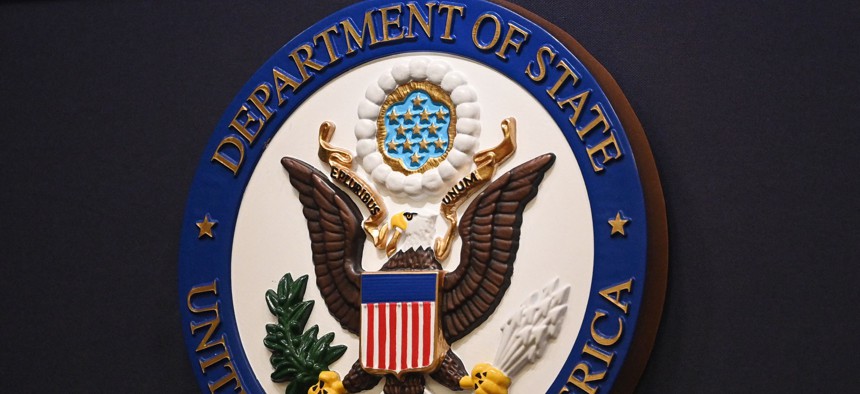
The Biden Administration's embrace of tools like the State Department’s “dissent channel” to discuss policies regarding the Israel-Hamas conflict has been praised by federal employees. MANDEL NGAN / Getty Images
State Dept. employees praise Biden administration for encouraging dissent
The administration has faced some criticism for censoring employee speech related to the Israel-Gaza conflict, but staff say internal channels are open for disagreement.
While parts of the Biden administration have faced criticism for restricting how employees can talk about the current war between Israel and Hamas, at least one agency is winning plaudits from employees for its willingness to cultivate dissent.
The origins of the State Department’s “dissent channel” date back to 1971, but agency leaders have met the formal pushback from employees with varying degrees of encouragement. Union officials and current employees praised the Biden administration for its willingness to engage with the feedback, saying the department has backed up its rhetoric with actionable follow-through.
Eric Rubin, a career Foreign Service employee and former ambassador who recently served as president of the American Foreign Service Association and recently retired from State after nearly four decades, said on Thursday during a panel discussion held by the association that the state of the dissent channel is “healthier now than at any point in my 38-year career.” Under the Trump administration, he said, “I think it's fair to say there was some hostility,” adding leaks to the media further soured the relationship between it and the career workforce.
Officials noted the workforce is in a unique position, as throughout government only State and U.S. Agency for International Development employees have access to such a platform. Holly Holzer, a current Foreign Service officer who serves as a senior official in the Bureau of Population, Refugees and Migration and recently held a top position in the policy office that oversees the dissent channel, said she has been pleased by the open dialogues that have taken place regarding Israel and Gaza.
“What I've been really impressed by with the current conflict is the number of sort of self organized, if you will, conversations and discussions that have been happening within the department about the conflict and I think those are really, really important,” Holzer said during the panel discussion. “Whether you're working on the issue directly or indirectly, it's important that we have forums and formats to have those kinds of conversations about particular policy issues that we are all wrestling with.”
She added those have taken place through affinity groups within the department, as well as other forums. She added that “no one likes criticism” and it was a “bold move” for State leaders to continue to solicit it.
“We live a lot in the gray area when we're making policy,” Holzer said. “And so it's really important for our key decision makers to have all of the information that they need in order to be able to make those really difficult choices.”
State Department employees have reportedly sent dissent cables to leadership to voice their support for a de-escalation of Israel’s offensive in Gaza, though employees there and agencies such as CIA have been warned against publicly using certain words regarding the conflict.
An anonymous group of more than 400 political appointees and career employees in the Biden administration recently put forward an open letter calling for a ceasefire and criticizing the U.S. government’s resolute support of Israel in the face of thousands of civilian deaths in Gaza, as reported by NBC News. That led Sen. Marco Rubio, R-Fla., to write a letter to the Office of Special Counsel asking it investigate any potential Hatch Act violations regarding the ceasefire call, which in turn led to OSC issuing new guidance clarifying that federal employees can discuss their opinions of the conflict in the workplace so long as they do not voice support or opposition for any politician or political party.
Last month, Matthew Miller, a State spokesman, said department Secretary Antony Blinker wants to hear from employees.
“He wants to hear what their opinions are,” Miller said. “He has spoken in the past about how he welcomes the dissent channel, and thinks it’s a very valuable channel, and that he likes to get feedback through it. And he hopes that people will use it. And he hopes that it continues to be protected.”
John Kirby, spokesperson for the National Security Council, said President Biden similarly would solicit viewpoints on the Israel-Hamas war from throughout the government.
“The president understands that there's strong emotions and feelings here, all around, all across the board,” Kirby said last month. “And here inside the administration and in the federal government, that's certainly the case as well. And he appreciates the fact that people feel strongly and that there are multiple perspectives. And we're going to continue to listen to them.”
Sara Berndt, a historian within the State Department, said the historical record makes clear that some secretaries have valued dissent and others “have not as much.” Those that have welcomed it have benefited from it, she added.
“I think that one of the most important things about the dissent channel is that it doesn't let high-level policymakers live in a bubble,” Berndt said.
She noted its users do not have to be part of the Foreign Service and while only a handful have become famous or public, there are hundreds of examples of its use. Rubin, who helped draft a widely publicized dissent memorandum criticizing U.S. policy toward Bosnia in the 1990s, advised State employees to stick to their areas of expertise and make specific, constructive suggestions, rather than simply criticizing a policy. He added it is never appropriate to publicly criticize the position of the government unless the employee first resigns. Federal employees must maintain their nonpartisan status and maintain trust with political appointees, he said.







